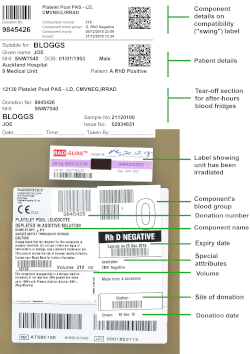The two-person bedside check is the "last best hope" for your patient to ensure that your patient gets the right component or product. What must I do?
- All checks must take place at the bedside of the patient.
- Use the Blood Administration Checklist !
- Identify the patient!
- by checking the wristband AND asking the patient to state his/her full name and date of birth.
- Tip: Do not read out the name and ask the patient if he/she is this person. Patients may be get confused and say "Yes" even if you say the wrong name.
- Complete the loop (See below)
- Check the prescription against the patient's wristband
- Check the wristband against the compatibility label
- Check the compatibility label against the component, including check the blood group on the unit is compatibile with the patient's blood group on the compatibility label
- Check the component type against the prescription
- Ensure a second person performs the checks independently as well
- There must be no discrepancies
Why is this so important?
- Unlike medicines, blood components contain antibodies which react
against some patients and not others. The component has been chosen by Blood Bank
specifically for your patient. If the component is transfused to a different patient,
it may cause a haemolytic transfusion reaction (breakdown of red cells) which can be fatal!
- The second reason is that, unlike manufactured medicines, blood
components/products are made from human material. There is always a small risk
that this may infect a patient. If a donor is subsequently identified to have
been infected, it is important to be able to track down the patients who received
the component/product for testing, counselling and treatment.

|


 Pre-transfusion checklist |




